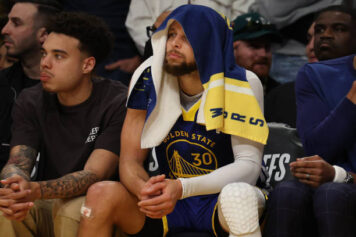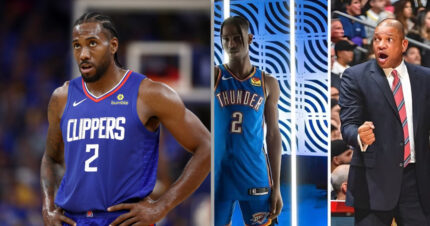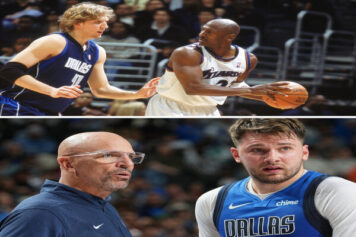Ten days after scoring his final NBA basket, Derek Fisher transitioned from coming off the bench to running it when the New York Knicks, or more pointedly, Phil Jackson, named him the team’s 26th head coach.
It’s been 41 years since the Knicks won their last title. And yet, despite the fact that Fisher and Jackson have a combined 18 titles between them, many Knicks fans are perplexed that the organization would hire someone with as much NBA coaching experience as Yinka Dare or Bookman from Good Times.
While the optimists laud the hire as a change in the right direction, the pessimists point out that this recipe – a first-year NBA coach with no coaching experience working under a team president with no management and decision-making experience as an executive, who are both on the hook for close to $85 million over the next five years – could be just as disastrous as when Bennifer teamed up in the movie Gigli.
Hiring a coach with no practical experience on any level is always risky, but Fisher seems to have the pedigree and leadership DNA to add credibility and lend him the benefit of the doubt.
For years, people have complained about the same, tired, usual suspects in the coaching fraternity being recycled. Remember Chris Ford? Bob Hill? Brendan Malone? Bill Fitch? Those guys were like old pairs of underwear that owners would turn inside-out and slip back on instead of throwing away, or at least washing.
Thank goodness the days of the retread seem to be over as the coaching climate has changed for the better. Most people will immediately point to Mark Jackson and Jason Kidd as barometers to Fisher’s situation as gritty, intelligent and accomplished players who recently made the transition successfully.
Basketball, specifically, much more than other sports, is filled with examples that suggest the move is not in any way riskier than bringing in someone with significant experience on the sidelines. Some examples that immediately come to mind are –
Lenny Wilkens – Every point guard that received an immediate opportunity as an NBA head coach without the normal apprenticeship and assistant coaching duties on their resumes owes a debt of gratitude to Wilkens, whose skills as a leader and teacher were recognized during his Hall of Fame playing career. Wilkens began as a player-coach with the Seattle SuperSonics and is one of only three men to be enshrined in the Hall of Fame as a player and a coach.
Don Nelson – Nelson retired from the Boston Celtics as a player in 1976 and was named as not only the head coach, but also the General Manager of the Milwaukee Bucks the very next season. His Milwaukee teams of the ‘80s were among the best teams of that era, obscured in the Eastern Conference by the great teams led by Larry Bird and Dr. J in Boston and Philly. A true innovator and constant tinkerer, he is credited with inventing the Hack-a-Rodman strategy, which later became widely known in its next incarnation as the Hack-a-Shaq, along with the concept of the "Point-Forward". Unfortunately, in New York, he is widely remembered for his bizarre 59-game stint as head coach of the Knicks in ’95-’96, when he inexplicably lobbied to have Patrick Ewing traded while sporadically starting the incomparable Matt Fish at center.
Scott Skiles – Skiles got his first head coaching gig while finishing up his career as a player in Greece. After one year as an assistant with Phoenix, Skiles got his first NBA head job with the Suns in 1999 and went on to win more than 50% of his games in Phoenix, Chicago and Milwaukee. Aside from his phenomenal 30-assist game with Orlando in 1990, where he set the NBA record, one of his other noteworthy contributions to the game was when asked, in 2003, what Bulls center Eddy Curry could do to improve his pedestrian rebounding numbers. Skiles’ classic reply was, “Jump.”
Doc Rivers – After retiring from the NBA, Rivers worked in broadcasting for a few years, making no secret about his ambitions to become a head coach and executive. When he accepted the Orlando Magic job in 1999, many thought they’d be the worst team in the league. And yet, he turned heads while molding Orlando, with a roster comprised of guys like Darrell Armstrong, Bo Outlaw, John Amaechi, Chucky Atkins, Chris Gatling, Michael Doleac, Scott Howard from Teen Wolf and Skeeter from 147th Street, into a rugged, competitive squad. He won an NBA title as the Celtics coach in 2008, and despite ESPN’s Bill Simmons being a terd in his champagne goblet, Rivers left the notoriously tough city as one of its most beloved coaching figures in modern history. Having returned the Clippers to national relevancy over the last few years, Rivers is on pace to become a coaching great.
Mark Jackson – Jackson won 23 games during the lockout-shortened season in 2012 with Golden State, but acquitted himself splendidly with 47 and 51 wins over the next two years, leading the franchise to consecutive playoff appearances for the first time in over 20 years. Unfortunately, he was yelling out, “Mama, there goes that man!” when he was given his unwarranted pink slip by the Warriors. But Jackson proved that he can take a young team with talent and put them on the road to success. It was Jackson’s success in Golden State that begat the ascension of the artist formerly known as Ason Kidd in Brooklyn (who earned that nicknamed early in his NBA career due to not having any semblance of a jump shot, or a “J” in street parlance).
Jason Kidd – Kidd became just the third player to retire, and within 16 minutes, be named an NBA Head coach since the ABA and NBA merged during the ’76-’77 season, following in the footsteps of Mike Dunleavy and Paul Silas. One of the underreported elements of the deal was that Kidd also purchased the minority ownership share of the franchise that once belonged to Jay Z. After getting off to a rocky start, he led the Nets to a second-round playoff appearance against the Miami Heat.
In his introductory press conference at Madison Square Garden, Fisher said, “I’m taking a tremendous amount of pride in coming here and doing my job. This is not a ceremony. This is not for PR. This is not for Phil and I to just hang out again as friends. This is to go to work and get our job done and we want to add more banners to this ceiling in here as we all continue to come back to this building on a daily, weekly, monthly, yearly basis.”
In reference to his inexperience as a tactician and coach, Fisher said, “There will obviously be a lot of talk about my inexperience as a head coach. That is obviously, factually true: I have not been a head coach in the NBA, or college or high school. But I am experienced. Basketball is a game that I am experienced in playing, understanding, leading in, guiding in, helping another group of people achieve the greatest gift in the world as a professional athlete — and that’s being a champion. That I have experience in.”
Given those experiences and his proven synergy as an on-court leader for Jackson during the Lakers most recent title runs, there’s no reason to believe that his youthful enthusiasm and knowledge of the game will be anything other than an asset for a team that finished 37-45 this year in a Eastern Conference that was weaker than puppy pee.
Fisher is a winner. To be fair, he’s not stepping into a great situation like Kidd did with the Nets, where he had proven veterans, or one like Steve Kerr, another former player with no head coaching experience who is taking over what Mark Jackson started with the Warriors.
The Knicks roster and collective team psyche are in need of a major overhaul.
Patience will definitely be required in the short term. But don’t be surprised when he finds success. As Doc Rivers proved when taking over a depleted Orlando Magic roster during his first job, along with the accomplishments of Wilkens, Skiles, Nelson, Jackson and Kidd, you don’t need prior experience as an NBA coach to attain success.
If you know and love the game, have been around it for a long time, understand team-building, chemistry, personality-management and are innately driven to succeed, you simply have to be able to lead, inspire and teach. Those are qualities that Fisher, who rose from obscurity at the University of Arkansas at Little Rock to become a five-time NBA champion, seems to possess in abundance.
“I think preparing myself for this moment and being the head coach of an NBA basketball team is something that started at six years old,” Fisher said. “I played my first game of organized basketball when I was six years old and though I was one of the better kids on that team, I’ve very rarely been the best player, the most talented, the tallest, the highest jumping, the best shooter on a basketball team. So right away as a young person I immediately had to start thinking about the game of basketball — how it was played, where I could find my advantage, and how I could be the most effective even if I wasn’t physically the most gifted or talented. So for the last 33 years that’s the way I’ve always viewed the game and in the last 18 years as an NBA player in this business that’s the only reason I’ve been around for 18 years is that I’ve thought the game as a coach. The angles, the advantages, the disadvantages, the spacing. Defensively, the best way to do things, especially as a guy that continued to age in this league. How can I defend and still be effective?”
As any long-suffering fan of the Knicks knows, it’s time for some new blood, a new way of thinking and some brand new funk in Madison Square Garden. And with Phil calling the shots from upstairs and Fish running things on the floor, it might be different from what folks have been accustomed to seeing.
But in this new age of fresh blood in the coaching ranks, different is not necessarily a bad thing.



